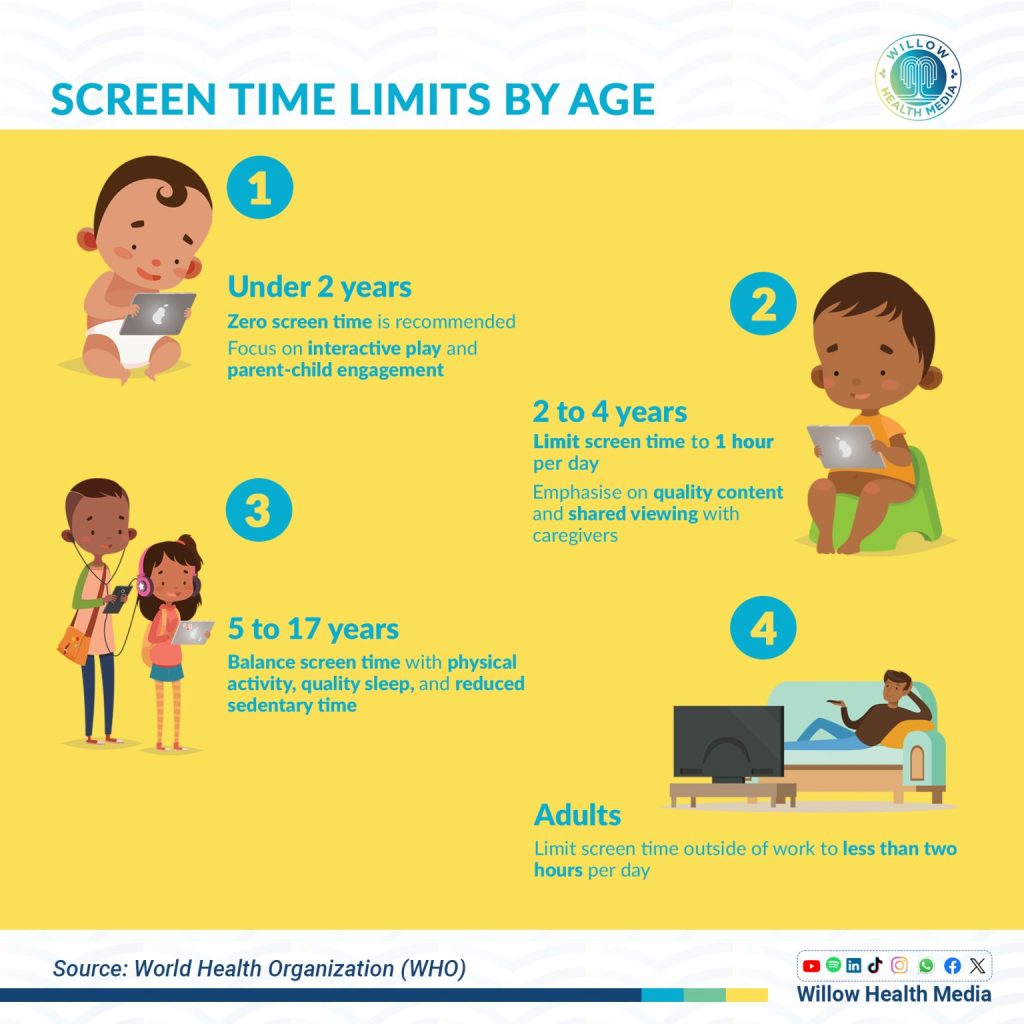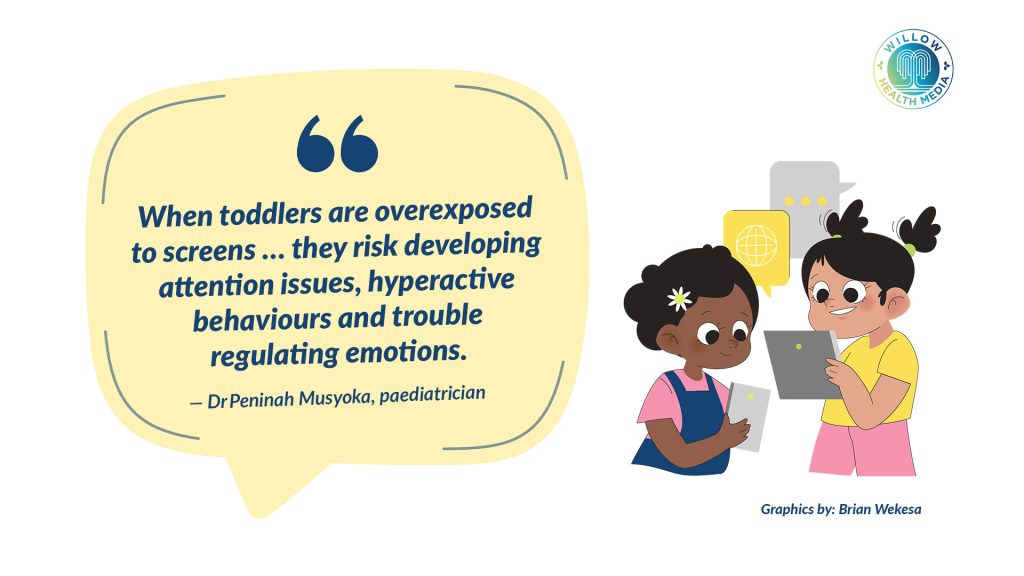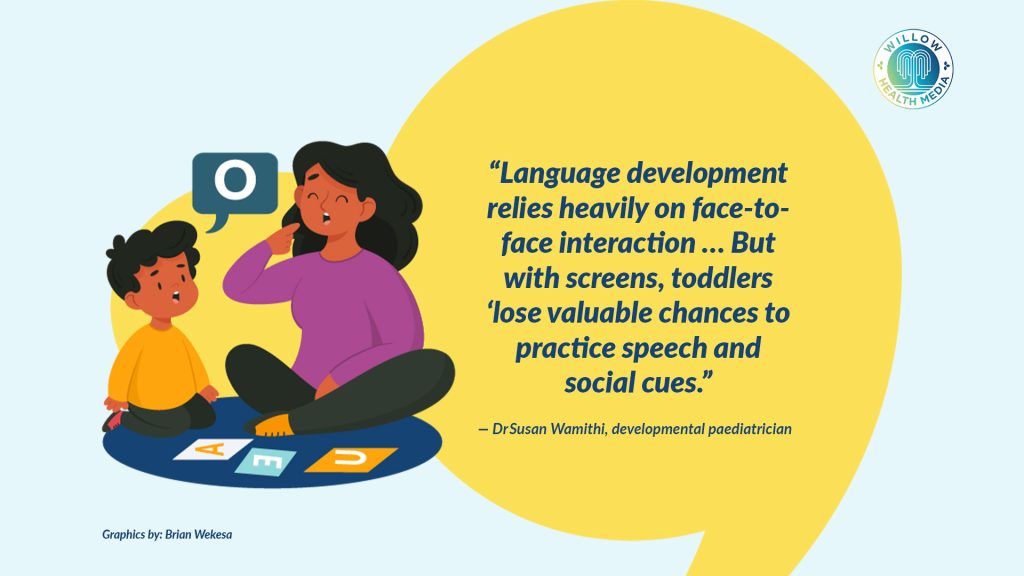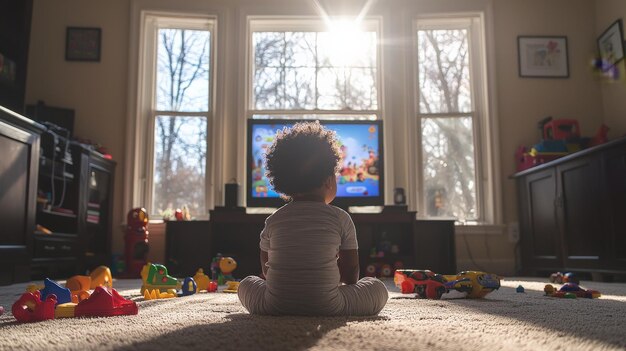Many parents overcheck their phones, which can affect their children’s self-worth and attachment – Dr Peninah Musyoka, Paediatrician
Screens are everywhere, from TVs, computers, laptops, smartboards, tablets, iPads, and Virtual Reality Headsets to smartphones, and they’re a convenient way for parents to entertain young children. But recent research links screen time to developmental risks- from language delays to sleep disruptions, and even obesity, especially for children under five years when physical play, interaction and exploration of their surroundings are important.
James Mbaluka and Winnie Chesaro from Nairobi are concerned that screen time is limiting the activities of their daughter, Mila.
“Living in a city doesn’t give us much outdoor space, so we encourage more physical play, like running or climbing.”
While screens can create an “easy escape” for busy parents out to buy peace, the short-term relief can compromise verbal exchanges that build vocabulary and communication skills.
To limit screen time, Winnie says, “I try to encourage her to play with toys or other activities, but screens can sometimes feel like the easiest option.”
Chesaro has noticed her one-year-old daughter is easily drawn to screens, and “If we put on Cocomelon, Mila runs to the TV,” which she sometimes uses as a temporary babysitter when on household chores. Winnie acknowledges the risks of her screen use to Mila, but reasons, “It’s hard to avoid exposing the child to technology, but we try our best.”
“When toddlers are overexposed to screens,” warns Dr Peninah Musyoka, a paediatrician from Machakos County, “they risk developing attention issues, hyperactive behaviours and trouble regulating emotions. Fast-paced content overstimulates their developing brains, which can lead to hyperactivity and impulsive behaviours over time.”

This overstimulation can hinder the ability to focus on real-world tasks, contributing to delayed speech, according to Dr Susan Wamithi, a developmental paediatrician at the Aga Khan University Hospital. She explains that language development relies heavily on face-to-face interaction to observe and mimic speech patterns, facial expressions and body language. But with screens, toddlers “lose valuable chances to practice speech and social cues.”
Screen time, especially before bed, can disrupt toddlers’ sleep patterns. The blue light emitted by screens interferes with the body’s natural melatonin production, making it harder for children to fall and stay asleep.
The result? Reduced sleep quality affects mood, cognition, daytime drowsiness, and irritability, according to a study in Paediatrics.
Dr Musyoka concurs that “quality sleep is essential for brain and overall development.” Yet, screens are often used to calm children down.

Derrick Njoki and Caroline Njeri, who live in Limuru’s rural landscape, leverage their environment to limit screen exposure for their one-year-old son.
Their access to greenery and domestic animals offers an alternative to screens, allowing their son to interact with nature instead. But come evening, screen time dominates and “even though we try to limit screen time, it’s hard to cut it out completely.”
Another risk of excessive screen time is the promotion of a sedentary lifestyle in which children sit still for extended periods, which, according to Dr Musyoka, impedes the development of motor skills and coordination. Obesity isn’t just about weight; it affects a child’s social development, self-esteem, and health.”
“Screens go with snacks and sedentary behaviour, which are hard habits to reverse.”
While eliminating screens entirely may not be realistic, moderation and mindful approaches can help.

The American Academy of Paediatrics (AAP) advises no screen time for children under two years, except for video chatting. For toddlers, screen time should be limited to high-quality educational content, ideally with parental involvement.
Reducing screen exposure at least one hour before bed can help improve sleep quality by allowing the body to produce melatonin naturally. But instead of screens, Dr Musyoka recommends bedtime stories or quiet play to help children wind down.
Simple activities like playing with toys, drawing, or engaging in outdoor exploration can prevent screen dependency and encourage healthy development.
For older toddlers, co-viewing educational programs can turn screen time into a more interactive experience while allowing parents to discuss content with their children.
Children learn by observing. Limiting personal screen time and creating screen-free family zones, especially during meals, shows children that human connection is a priority.
Derrick has a habit of dispensing with his phone to be fully present with his son, and “this way, he learns that there’s more to life than screens.”
As Dr Wamithi advises, “It’s not the screen itself that’s harmful but the loss of crucial human interaction and active play that screen time often replaces.”
Besides children, parental screen time and habits also have repercussions on their children’s health and development, urging a careful look at how adult habits shape children’s formative years. Like background television, which is when the TV is turned on while toddlers are present, even if they’re not actively engaging with it.
However, constant auditory and visual stimuli can lead to cognitive overload and the inability to focus on developmental tasks.
Dr Joy Njiru’s and Prof Paul Odundo’s research, The Impact of Screen Time on Cognitive and Socioemotional Development in Contemporary Childhood in Kenya, shows that “increased exposure to ambient television and other screen devices results in adverse effects on children’s cognitive capacities, executive functioning, and language acquisition.”
Dr Wamithi points out that, to learn effectively, children need focused, quiet spaces to engage with their toys, caregivers and thoughts—essential elements for cognitive and language development.
Njeri is philosophical that “unless you have no screens at all, complete avoidance feels impossible,” but she prioritizes minimizing screen use around her son.
Indeed, studies published in the Journal of Children and Media note that parents speak less and use simpler language when a TV is on, leading to fewer opportunities for toddlers to hear rich, complex language delaying language acquisition.
Besides TV, many parents use their phones throughout the day and studies show that frequently checking phones around toddlers may be modelling behaviours that encourage excessive screen use later in life. Dr Musyoka points out, “when parents are absorbed it sends the message that screens are more important than the child’s immediate world, which can affect self-worth and attachment.”
Recent research underscores the significant impact of parental screen behaviours on children’s development. A study published in JAMA Pediatrics found that increased screen time in children aged 12 to 36 months was associated with reduced parent-child interactions, including fewer adult words spoken, fewer child vocalizations, and fewer conversational turns. Furthermore, a study in BMC Public Health found that children whose parents had higher screen time were more likely to have excessive screen use themselves.
When considering the impact of screen time on toddlers and infants, it’s important to recognize that its effects vary depending on age and how the screen time is used. For toddlers (2+ years), educational content can be beneficial, helping to enhance vocabulary, cognitive skills, and early learning. Shows like Sesame Street or apps designed for this age group can support language development, but it’s essential for parents to co-view the content to reinforce learning and engage in meaningful conversations with their child.
For infants (6 months+), video calls with family members can provide social interaction that fosters early recognition of social cues and connections. This can be particularly helpful for children who may be distant from extended family, allowing them to hear familiar voices and see faces. Parents should be involved in these interactions, guiding the child’s responses and modelling appropriate behaviours.
While screen time can offer benefits, especially in moderation and with appropriate content, it should never replace physical activity or human interaction. For children under 2 years, screen time should be limited to video chats only. For toddlers, the key is to restrict screen time to 1 hour per day of high-quality content and actively involve parents in the experience to ensure it is educational and enriching.
This story was first published by Willow Health Media on November 16, 2024.





















